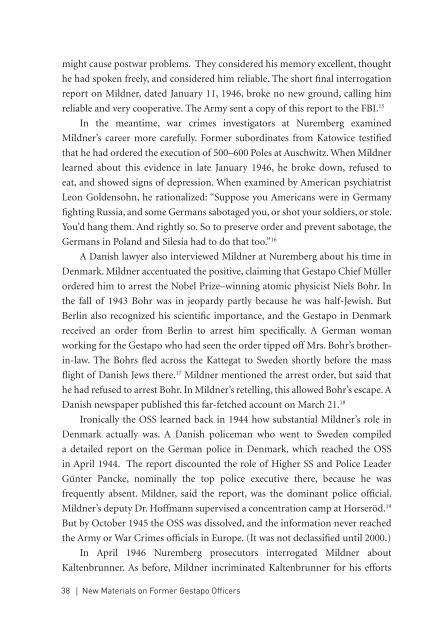hitlers-shadow
hitlers-shadow
hitlers-shadow
You also want an ePaper? Increase the reach of your titles
YUMPU automatically turns print PDFs into web optimized ePapers that Google loves.
might cause postwar problems. They considered his memory excellent, thought<br />
he had spoken freely, and considered him reliable. The short final interrogation<br />
report on Mildner, dated January 11, 1946, broke no new ground, calling him<br />
reliable and very cooperative. The Army sent a copy of this report to the FBI. 15<br />
In the meantime, war crimes investigators at Nuremberg examined<br />
Mildner’s career more carefully. Former subordinates from Katowice testified<br />
that he had ordered the execution of 500–600 Poles at Auschwitz. When Mildner<br />
learned about this evidence in late January 1946, he broke down, refused to<br />
eat, and showed signs of depression. When examined by American psychiatrist<br />
Leon Goldensohn, he rationalized: “Suppose you Americans were in Germany<br />
fighting Russia, and some Germans sabotaged you, or shot your soldiers, or stole.<br />
You’d hang them. And rightly so. So to preserve order and prevent sabotage, the<br />
Germans in Poland and Silesia had to do that too.” 16<br />
A Danish lawyer also interviewed Mildner at Nuremberg about his time in<br />
Denmark. Mildner accentuated the positive, claiming that Gestapo Chief Müller<br />
ordered him to arrest the Nobel Prize–winning atomic physicist Niels Bohr. In<br />
the fall of 1943 Bohr was in jeopardy partly because he was half-Jewish. But<br />
Berlin also recognized his scientific importance, and the Gestapo in Denmark<br />
received an order from Berlin to arrest him specifically. A German woman<br />
working for the Gestapo who had seen the order tipped off Mrs. Bohr’s brotherin-law.<br />
The Bohrs fled across the Kattegat to Sweden shortly before the mass<br />
flight of Danish Jews there. 17 Mildner mentioned the arrest order, but said that<br />
he had refused to arrest Bohr. In Mildner’s retelling, this allowed Bohr’s escape. A<br />
Danish newspaper published this far-fetched account on March 21. 18<br />
Ironically the OSS learned back in 1944 how substantial Mildner’s role in<br />
Denmark actually was. A Danish policeman who went to Sweden compiled<br />
a detailed report on the German police in Denmark, which reached the OSS<br />
in April 1944. The report discounted the role of Higher SS and Police Leader<br />
Günter Pancke, nominally the top police executive there, because he was<br />
frequently absent. Mildner, said the report, was the dominant police official.<br />
Mildner’s deputy Dr. Hoffmann supervised a concentration camp at Horseröd. 19<br />
But by October 1945 the OSS was dissolved, and the information never reached<br />
the Army or War Crimes officials in Europe. (It was not declassified until 2000.)<br />
In April 1946 Nuremberg prosecutors interrogated Mildner about<br />
Kaltenbrunner. As before, Mildner incriminated Kaltenbrunner for his efforts<br />
38 | New Materials on Former Gestapo Officers


